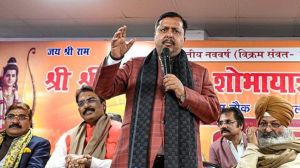The Big Bangs Theory
Simple steps made a difference, say the Bangs. An instrument to check the heartbeat, a sleeping bag THEY call it SEARCH Society f...

|
Simple steps made a difference, say the Bangs. An instrument to check the heartbeat, a sleeping bag |
THEY call it SEARCH Society for Education, Action and Research in Community Health and, for most entities active in public health, the search ends with the Bang couple, Rani and Abhay. The doctor-duo illustrate perfectly the difference possible through small interventions within the community; little wonder, then, they are one of Time magazine8217;s heroes for the year 2005.
Perhaps more to their taste, their model to bring down the Infant Mortality Rate is to be replicated in four states across India.
In 1985, the Bangs graduated top of the class at Johns Hopkins University, USA, and came back to Gadchiroli, Nagpur, to launch SEARCH and work to provide basic healthcare to the people, especially children. In the past 20 years, the NGO carried out extensive studies and research in Gadchiroli and designed its own pattern of providing treatment and health care for the tribal patients.
In 1989, the Bangs published the results of their three-year-long study, conducted in association with 15 NGOs, on child mortality. The article shook the medical fraternity: They established that it was neonatal mortality that was claiming more infants than any other single cause. In the post-neo natal group one month to five years, the principal causes were pneumonia and diarrhoea.
SEARCH provides home-based neonatal care HBNC to mothers and newborns with the help of trained village health workers, who are also trained to diagnose diarrhoea, pneumonia and minor ailments and provide the necessary medical aid.
Deciding that early diagnosis was the key to saving the child, the Bangs also invented a simple instrument that detects the heartbeat of a child. On the care front, they came up with a sleeping bag to protect the newborn from exposure-related diseases. Both the heartbeat-detector and the sleeping bag cost less than Rs 150 and can be bought by community midwives.
Slide shows are conducted in the community to generate awareness about health and hygiene. The SEARCH team also conducts one-to-one interraction with the community members and the health workers.
In addition, SEARCH has set up the Maa Daneshwari Hospital, where antenatal care, neonatal care and deliveries are conducted through specialist consultation.
Says Rani Bang, 8216;8216;We have achieved remarkable results in our work, especially in providing the health care to the neonates. We have also succeeded in bringing down the death rate.8217;8217;
The same, though, can8217;t be said of the state government8217;s role. 8216;8216;NGOs working in any sector have limitations. Their reach is restricted. Besides, it is the government8217;s responsibility to take steps to curb the child deaths.8217;8217;
NGO work, as she sees it, is to identify the problems, find solutions and present them before the government for replication. 8216;8216;We submitted a report to the government about a year ago. The then chief minister visited Gadchiroli and announced that the government would work to solve the problem. It remains an announcement,8217;8217; she says.
8216;8216;On the other hand, our experiments have been accepted worldwide and even countries like Pakistan and Bangladesh are replicating it.8217;8217; Maybe the Time recognition will make a difference.
- 01
- 02
- 03
- 04
- 05































